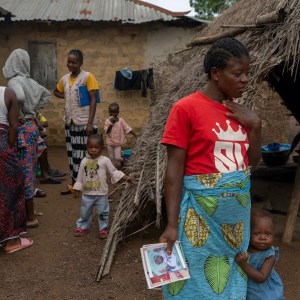Struggles in Liberia: A Farmer’s Search for Contraceptives
In the village of Sarworlor, Liberia, 32-year-old Roseline Phay is facing a tough challenge. With two daughters and limited resources, she desperately wants to prevent another pregnancy. Five months ago, she set out to find contraceptives, hoping to secure a better future for her family.
Phay first approached a local health worker but found that the usual stocks of pills, implants, and condoms were empty. Determined, she made multiple trips to a nearby clinic, only to discover they also had no contraceptive options available. Each journey took hours along rough, red clay roads.
Sadly, Phay’s perseverance did not pay off. Before she could find what she needed, she became pregnant again. Holding her daughter Pauline in her arms, she stated, “I have this little child on my back, and the other child in my stomach is suffering.” The pressure of farming while pregnant feels unbearable. “I must keep working or there will be no food to eat,” she added.
After her pregnancy began, Phay had to stop breastfeeding. Pauline became malnourished and nearly died due to a lack of therapeutic food. Phay’s struggle is not unique. She represents millions in Africa impacted by significant cuts to U.S. foreign aid, which include vital healthcare support.
According to the Center for Global Development, American aid constitutes about 2.6% of Liberia’s gross national income—more than any other country. When the Trump administration suspended most foreign aid through USAID, it uprooted lives and services across Liberia.
Richlue O. Burphy, who has extensive experience working with USAID, remarked, “The impact of USAID in Liberia cannot be overstated.” The country has a long history of relying on U.S. assistance, dating back to 1961. With a political system modeled after the U.S. and a flag that echoes its design, Liberians often view the United States as a “big brother.”
This historical connection has made the aid cuts feel like a betrayal. Liberia has faced numerous challenges, including civil wars and an Ebola outbreak, which exacerbated poverty. The World Bank reports that nearly 60% of Liberians live in poverty, making the withdrawal of aid especially devastating.
In 2023, Liberia was set to receive $443 million in U.S. assistance, but the cuts have already impacted an estimated $290 million. This reduction is particularly alarming for the healthcare sector, which relies on aid for 48% of its budget. Services such as maternal care, HIV treatment, and malaria control are at risk, according to Deputy Finance Minister Dehpue Y. Zuo.
The consequences are visible in Phay’s community. Health clinics are running low on supplies, ambulances lack fuel, and community health workers have gone unpaid. Moses K. Banyan, head of a local hospital, described the situation as a “shock” and noted rising health risks, particularly with cases of mpox spreading from neighboring countries.
On the other hand, the withdrawal of U.S. support opens doors for alternative partnerships. Experts are noting China’s increasing presence in Liberia, with companies involved in mining and infrastructure projects. Many Liberians who previously aspired to study in the U.S. are now shifting focus to China, reflecting a broader geopolitical change.
In Sarworlor, community health worker Alice Togbah still wears her USAID vest, even though the supplies are gone. Families are struggling to find malaria treatments. Grace Morris, a local mother, has seen children suffer due to lack of medication, noting that “children die from malaria here.”
For women like Phay, access to contraception is not just about family planning; it’s about being able to take control of their lives. “If I have no medicine, I will get pregnant,” she explained.
Even with all these challenges, Phay dreams of a better life for her daughters. She wants them to finish school and live without the burdens she faces. “I am begging, if you can help us find the medicine,” she said. “I don’t want her to suffer like me.”
As these struggles continue, the tale of Roseline Phay is just one of many highlighting the urgent need for reliable healthcare resources in Liberia and across Africa. For ongoing insights on Africa’s development, you can follow updates from AP News.
Source link
health worker, Liberia, Roseline Phay, foreign aid, USAID, health, President Donald Trump, community health


